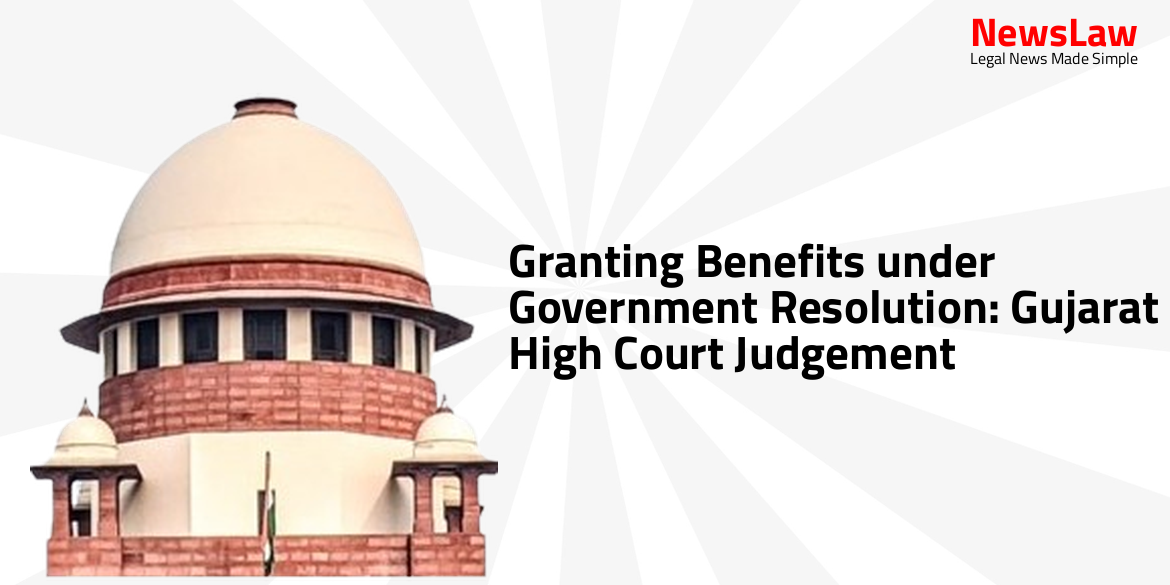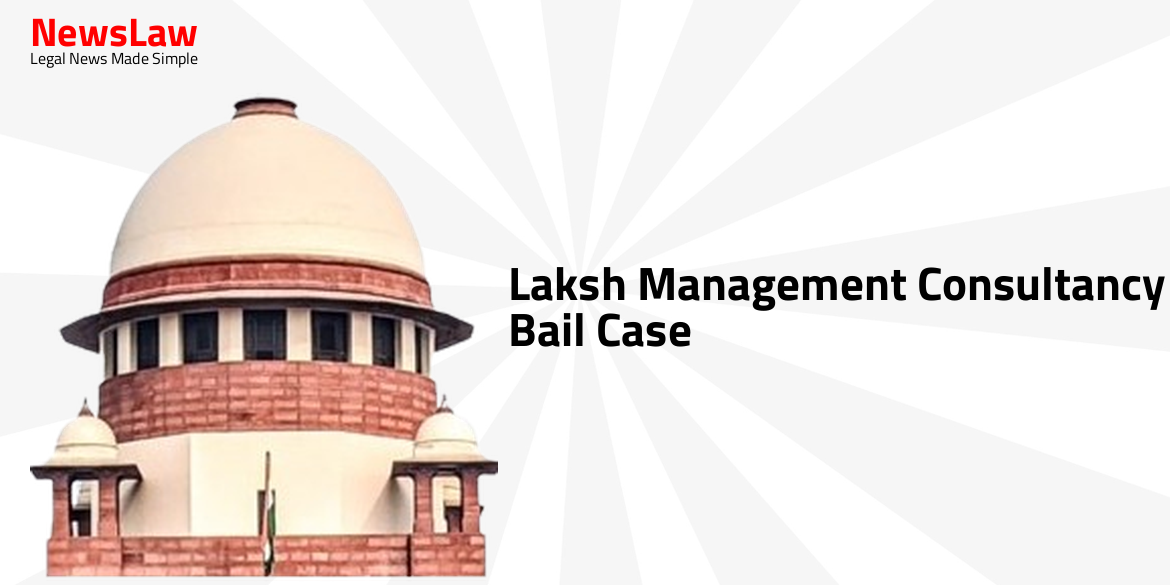In a landmark decision by the Gujarat High Court, benefits under the Government Resolution have been granted to the deserving party. This judgement sets a precedent for similar cases in the future, ensuring fairness and justice in legal proceedings.
Facts
- The appellant had filed for Letters Patent Appeal No. 47/2007 which was allowed, setting aside the impugned order of 11.10.1995 due to lack of opportunity given to the petitioner.
- The appellant was subsequently dismissed from service on 26 November 1997.
- The appellant made a detailed representation on 23.02.2011 requesting a pay scale revision.
- An order was passed on 17.11.2011, stating the petitioner is not entitled to benefits of a Government Resolution and initiating recovery for alleged excess wages.
- Despite multiple representations and legal notices, the decision on pay scale revision was delayed, leading to a suit being filed by the appellant for declaring the termination null and void.
- The order dated 11.10.1995 mentioned an audit objection regarding excess salary paid to the appellant.
- The benefits granted via a letter on 26/06/1990 were withdrawn upon audit objection.
- A Special Civil Application was filed by the appellant challenging actions against him.
- The Division Bench, on principles of natural justice, directed the revision of pay scale and adherence to prior orders.
- The appellant was called for personal hearings and representations, seeking the revision of pay scales from 1995 until the present.
- The lower appellate Court found the order of the D.I.G. to reinstate the plaintiff illegal.
- The lower appellate Court set aside the direction for payment of 25% back wages.
- The Labour Court did not specifically deny continuity of service to the appellant.
- The appellant’s salary was deducted for the period in question when work was disrupted.
- Engagement of personnel without following legal procedures led to the refusal of continuous service benefit by the court.
- The Labour Court directed reinstatement of the plaintiff due to breaches of certain sections of the Industrial Disputes Act.
- The High Court confirmed the lower appellate court’s decree denying arrears salary and continuity of service to the plaintiff.
- The High Court unjustly set aside the award of 25% back wages by the Labour Court.
- The Single Judge upheld the Labour Court’s decision that the punishment imposed on the appellant was harsh.
- The Single Judge also overturned the order for payment of 25% back wages while affirming reinstatement.
- The appellant is entitled to continuity of service.
- Back wages to the appellant were not awarded in full but only at 25% due to specific circumstances.
- The High Court’s observation that the Labour Court denied continuity of service was deemed incorrect and corrected.
- The payment of back wages was not deemed automatic upon reinstatement by the Single Judge.
- The award of reinstatement and 25% back wages to the appellant was allowed, given his retirement during proceedings.
- The Labour Court granted continuity of service to all workmen, which was later confirmed in a higher court.
- The reasoning used to deny continuity of service by the employer was found invalid by the Labour Court.
- The denial of benefits under a certain Resolution was clarified through a communication from the Archaeological Department.
Issue
- The Labour Court has ordered the first party to reinstate the second party.
- The second party is to be reinstated in service with 25% back-wages.
- Reinstatement must be done within 30 days from the publication of the order.
- Continuity of service would follow as a matter of law upon reinstatement.
Arguments
- Petitioner’s counsel argued that the denial of benefits to the petitioner by the respondent authorities is unjust, unreasonable, and arbitrary.
- The counsel mentioned that the petitioner is eligible for the benefits based on past decisions of the Apex Court and the High Court.
- The Labour Court’s award was misunderstood by the High Court as denying continuity of service, which the counsel argued was not the case.
- Counsel cited various decisions of the High Court and the Apex Court to support the petitioner’s claim for benefits under the Government Circular dated 17.10.1988.
- The counsel emphasized that the petitioner has been overlooked by the respondents in granting the benefits of the Government Circular and thus should be entitled to those benefits.
- The Letters Patent Appeal filed by the appellants challenges a judgment granting benefits under the Government Resolution to the petitioner.
- The counsel urged the Court to allow the present petition and set aside the actions of the respondent authorities, granting the petitioner the benefits sought.
- Petitioner entitled to wages for the period he was illegally kept out of service.
- The period during which petitioner was unlawfully prevented from working is specified.
Analysis
- The policy of granting benefits to daily-wagers under the Government Resolution dated 17.10.1988 is applicable in various departments of the government.
- The denial of benefits to the petitioner based on lack of procedure at the time of engagement goes against the government’s policy and is discriminatory.
- Established legal principles indicate that reinstatement should come with continuity of service and the benefits of the Resolution.
- The Labour Court’s reasoning for denying benefits due to procedural issues is not valid according to established legal precedents.
- The petitioner has been actively working since 24.11.1988, accumulating about 25 years of service, making the denial of benefits unjust.
- The petitioner deserves the benefits as per the Resolution dated 17.10.1988, especially after the court’s direction to grant continuity of service.
- PWD Employees Union (supra) had a similar set of facts where the petitioners were denied the benefits of Resolution dated 17.10.1988.
- The Court found that the petitioner is entitled to the benefits of the Government Resolution dated 17.10.1988 and the denial by the Labor Court was illegal.
- The decision in Kutch District Panchayat (supra) was also relied upon in another case, Jayantibhai Venabhai Patel vs State of Gujarat, where similar benefits were denied based on the date of employment.
- The petitioner was denied benefits of Resolution dated 17.10.1988 on the grounds of being appointed subsequent to 01.10.1988, which is not a valid reason as per the law.
- The Resolution dated 17.10.1988 is applicable to all departments of the State of Gujarat as per the Supreme Court ruling in State of Gujarat and others Vs. PWD Employees Union and others [2013(8) Scale 579].
- The denial of benefits based on the petitioner not being in the Road & Building Department is not valid as per the aforementioned Supreme Court ruling.
- Since there are no disputed facts, the petitions are required to be allowed and have succeeded.
- Therefore, in this view of the matter, the petitions should be allowed based on the settled law.
Decision
- The petitioner shall be granted benefits counting his entire period of service from the initial date of appointment.
- The pay of the petitioner for the last 26 years shall be revised, including Dearness Allowance admissible and arrears to be paid pending further proceedings.
- Consequential benefits, including those of the 6th Pay Commission, to be given to the petitioner as to similarly situated employees.
- Government Circular benefits from 17.10.1988 to be conferred upon the petitioner within four months.
- The benefits of State Government Resolution dated 17.10.1988 to be granted to the petitioner.
- Resumption of the benefits under the Government Resolution dated 17.10.1988 for reinstated workmen.
- All daily wagers completing requisite service years entitled to benefits as per the Government Resolutions of 17.10.1988 and 01.05.1991.
- Compliance with orders issued in various civil applications pertaining to the benefits under the said Resolutions.
- Uniform entitlement of benefits for employees pre and post the Resolution date based on service length.
- Extension of benefits from Government Resolution dated 17.10.1988 to the petitioner’s initial date of appointment as a Wireman on 24.11.1988.
- All benefits to be paid to the petitioner within eight weeks of the order receipt.
- Permanent status upon ten years of service completion with regular payscales extension.
- Extension of retirement benefits after the petitioner’s superannuation age.
- Dismissal of Letters Patent Appeal and disposal of related Civil Applications with no costs.
- Setting aside of benefits not compliant with the current order.
Case Title: DILIPBHAI GOPALBHAI BAVALIYA Vs. STATE OF GUJARAT THRO THE SECRETARY
Case Number: R/SCA/17607/2011



